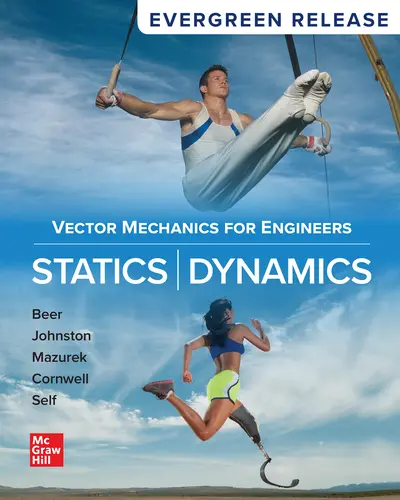My Account Details

ISBN10: 1260710890 | ISBN13: 9781260710892

* The estimated amount of time this product will be on the market is based on a number of factors, including faculty input to instructional design and the prior revision cycle and updates to academic research-which typically results in a revision cycle ranging from every two to four years for this product. Pricing subject to change at any time.
Instructor Information
Quick Actions (Only for Validated Instructor Accounts):
Vector Mechanics for Engineers helps students analyze problems in a simple and logical manner and then apply basic principles to their solutions, encouraging a strong conceptual understanding of these basic principles. Offering a unified presentation of the principles of kinetics and a systematic problem-solving approach, the text has proven to be an effective teaching tool, especially when paired with the digital resources available in Connect. The addition of Case Studies in every chapter are based on actual structures and systems, include failures, provide students with real-world engineering applications. And Sample Problems, liberally used at the end of each lesson, align with the SMART methodology to amplify the neat and orderly work students should cultivate in their own solutions.
1. Introduction
2. Statics of Particles
3. Rigid Bodies: Equivalent Systems of Forces
4. Equilibrium of Rigid Bodies
5. Distributed Forces: Centroids and Centers of Gravity
6. Analysis of Structures
7. Internal Forces and Moments
8. Friction
9. Distributed Forces: Moments of Inertia
10. Method of Virtual Work
11. Kinematics of Particles
12. Kinetics of Particles: Newton's Second Law
13. Kinetics of Particles: Energy and Momentum Methods
14. Systems of Particles
15. Kinematics of Rigid Bodies
16. Plane Motion of Rigid Bodies: Forces and Accelerations
17. Plane Motion of Rigid Bodies: Energy and Momentum
Methods
18. Kinetics of Rigid Bodies in Three Dimensions
19. Mechanical Vibrations
Appendix A: Fundamentals of Engineering Examination
(Section and Problem Correlation)
Answers to Problems
Index
Properties of Geometric Shapes
Accessibility
Creating accessible products is a priority for McGraw Hill. We make accessibility and adhering to WCAG AA guidelines a part of our day-to-day development efforts and product roadmaps.
For more information, visit our accessibility page, or contact us at accessibility@mheducation.com
Affordability
Reduce course material costs for your students while still providing full access to everything they need to be successful. It isn't too good to be true - it's Inclusive Access.
Need support? We're here to help - Get real-world support and resources every step of the way.